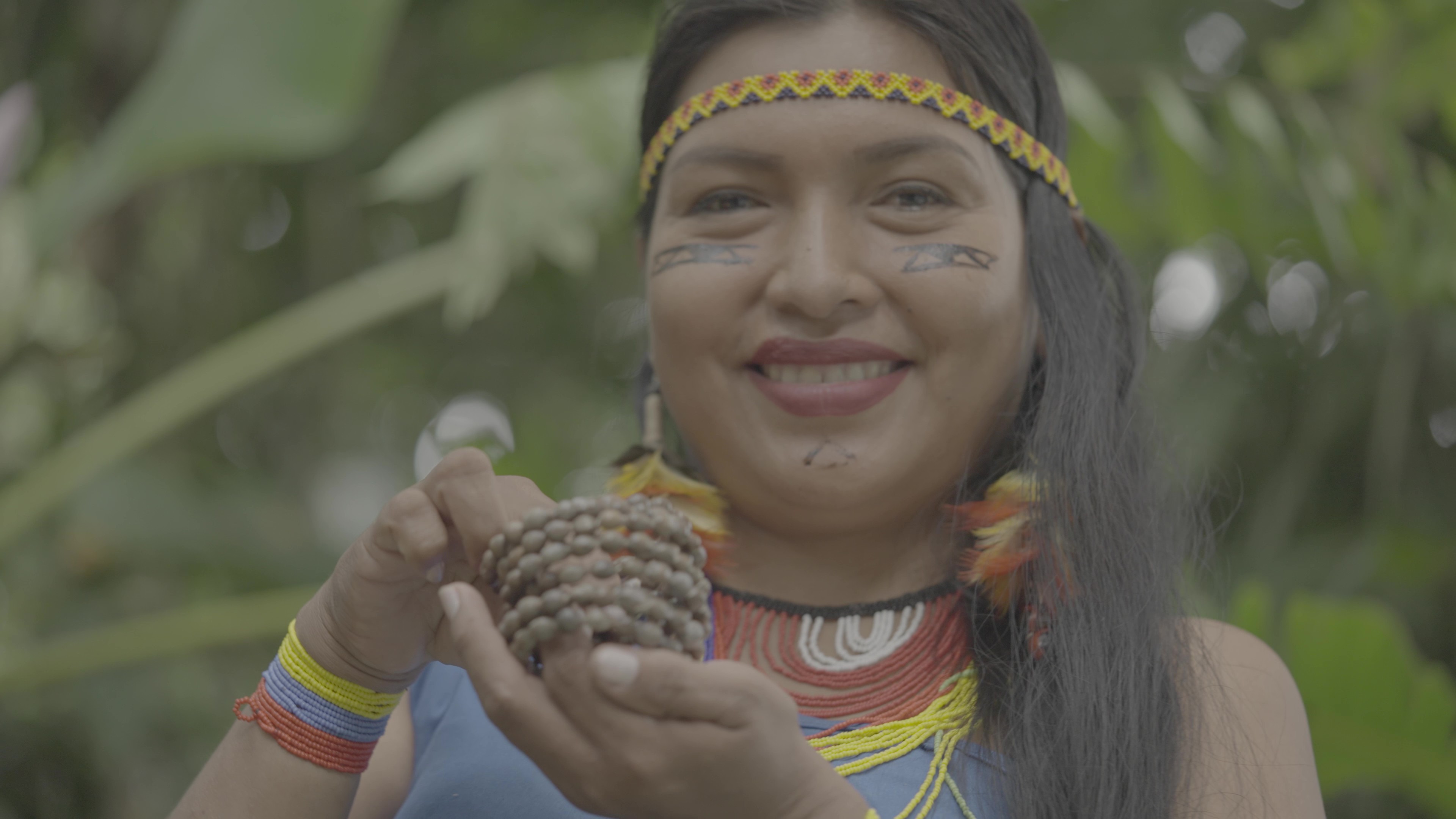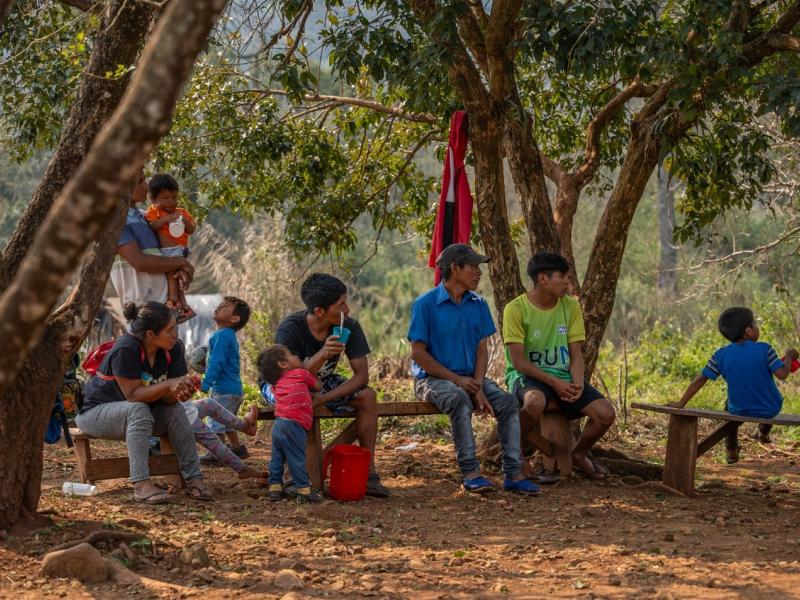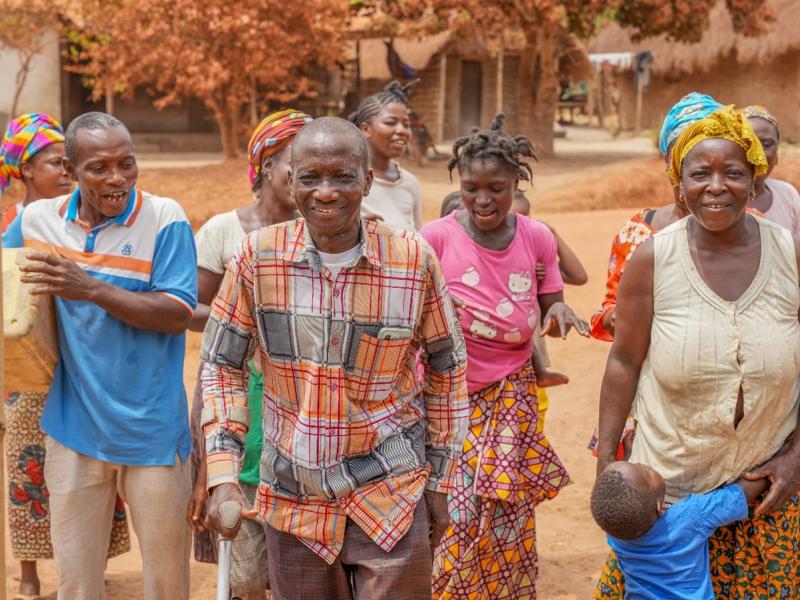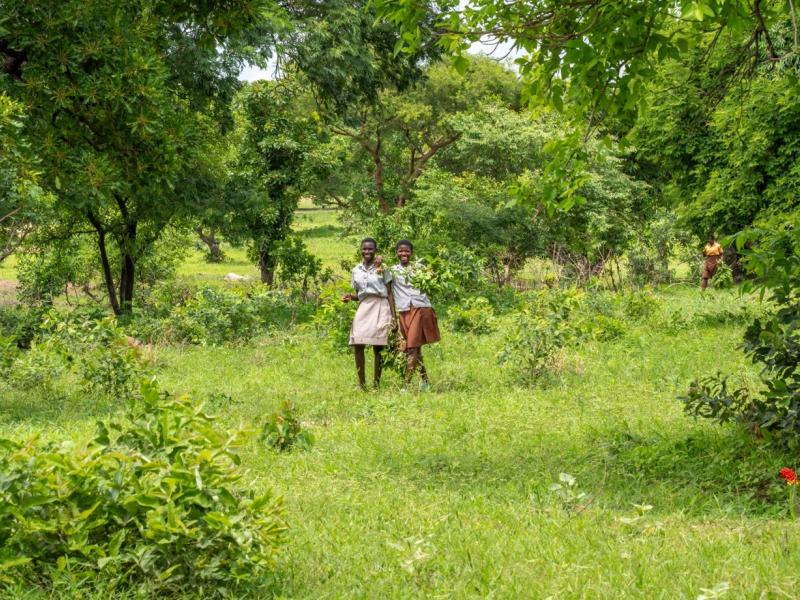PROAmazonia Ecuador
Irma Tsahuanda is a Shuar leader from the Yamanunka community, serving as treasurer and administrator of the Nua Kakaram (Brave Women) Association. Committed to preserving her Indigenous heritage, Irma focuses on forest conservation and protecting ancestral knowledge. Through her work, she supports Shuar women to restore traditional practices, develop sustainable crafts, and contribute economically to their families. Irma plays a key role in promoting women’s leadership within and beyond her community – and ensuring the next generations continue to protect their land and culture.
How do you imagine the community without a forest?
Without trees, life in the community would be unrecognizable. It would be sad and desolate. No birds would arrive in the mornings; the air would be silent without their songs. The sun would shine too brightly, scorching everything, and the land would feel lifeless. The forest is more than trees, the forest serves as the Earth's lungs – it is life, providing shade, shelter, and a deep connection to our culture.
How do you care for the environment?
As Shuar women of Yamanunka, we have taken an active role in restoring the forest and protecting our traditional environment. We focus on reforesting endemic plants and preserving our ancestral seeds, which are vital to our culture and crafts. These plants are used for healing, for food, and for creating the traditional items that reflect who we are. Most importantly, we pass this knowledge on to our children and encourage them to continue this legacy for future generations. We show them which plants are useful for medicine, which ones provide shade, and how every plant has its purpose. In this way, we protect not only our forest but also our identity.
Are women playing a leading role in conservation?
Absolutely. We women have always had a close connection to the land. Our mothers and grandmothers taught us the uses of each plant for traditional medicines and daily life. Unfortunately, as outsiders arrived in our region, they brought practices that led to deforestation and overexploitation of resources. That disrupted the balance we had with nature. However, we women are now reclaiming our role as protectors of the forest. We are leading the way in conservation efforts to protect our land, restore traditional practices, and ensure a sustainable future for the community.
What is Yamanunka’s responsibility to the environment?
As Shuar people, it is our responsibility to care for the forest, the rivers, and the land. These natural elements are essential to our lives. We see ourselves as guardians of the forest – caretakers of the soil and water that sustain us. Protecting the environment is not just a duty; it’s part of who we are.
Have you seen a change in the community?
Yes, there has been an important change. We’ve worked hard to pass on conservation practices to our children, our siblings, and even to our mothers. In the past, we often cut down trees to build our homes without thinking about the long-term impact. Now, we are more aware of how to balance our needs with the health of the environment. This change has been especially important for the younger generation, who are more conscious of sustainability and eager to continue our efforts.
What role has PROAmazonía played in this change?
PROAmazonía has played a vital role in our transformation. It has empowered us as women by teaching us how to develop bio-enterprises, such as handicrafts and gastronomy, while also raising our environmental awareness. Through their workshops, we’ve learned new and advanced techniques to improve our work and care for the environment at the same time. One of the most important outcomes has been the development of our Life Plan. This plan serves as a guide for our community, outlining our priorities and projects to protect the forest and strengthen our traditions. It gives us a clear direction and helps us focus on sustainable development.
What is the role of women now?
The role of women has completely changed. In the past, our society was very patriarchal. Shuar men were often dominant, and women had little freedom to make decisions or participate in community leadership. Thanks to the empowerment efforts of projects like PROAmazonía, women have found their voice and strength. We are no longer silent or confined to the home.
Now, we are empowered, independent, and confident. We’ve learned that we can work, lead, and bring daily sustenance to our families. Our husbands respect us more, recognizing that we have the right to pursue our own goals and develop our skills. If I want to attend a workshop or focus on my craftwork, I can do so with their full support. We were born free, and now we truly live that freedom.
Do women contribute financially to the family?
Yes, we contribute significantly. In the past, women stayed at home, taking care of the children and waiting for their husbands to bring money home. That’s no longer the case. Through our handicrafts, we generate income for our families. When we sell a piece for $20, it’s not just money – it’s a symbol of our hard work and creativity. This financial contribution makes us feel useful, proud, and fulfilled.
The work also inspires us to keep going. Seeing people from outside the community admire and purchase our crafts fills us with joy and motivates us to continue. It helps us realize that our skills are valuable and that we have the power to provide for our families while keeping our culture alive.
How do women contribute to the economy through handicrafts?
We’ve had a significant impact on our community’s economy. Through our association of Shuar women artisans, we’ve gained recognition at both the provincial and cantonal levels. We have shared our culture through our dances, crafts, gastronomy, and worldview, raising the profile of Yamanunka.
Our handicrafts aren’t just products—they are expressions of our culture and identity. Every piece tells a story about our traditions and our connection to the forest. Our work has helped us gain visibility and respect, both within and beyond the community.
What does Yamanunka mean?
Yamanunka means “new land.” True to its name, our community is working to restore and protect the forest. We are committed to ending the indiscriminate logging that once threatened our environment. Our focus is now on conservation, ensuring that our forest remains healthy and vibrant for future generations.
-------------------------------------------------------------------------------------------
This interview was recorded by UNDP Climate, with support from the UN-REDD Programme showcasing PROAmazonia’s work on the territorial life plans in the Yamanunka territories of Ecuador.
UNDP Climate & Forests systematically promotes social equity, including the rights, knowledge, and inclusion of Indigenous Peoples and local communities, to ensure forest solutions to climate change contribute meaningfully to delivering on the NDCs and advancing the SDGs.
The views expressed in this interview are solely those of the interviewee and do not necessarily reflect the official policies or positions of UNDP.
«Las mujeres reclaman su papel en la protección de la selva» - Entrevista con la líder shuar Irma Tsahuanda
Irma Tsahuanda es una líderesa shuar de la comunidad yamanunka, tesorera y administradora de la Asociación Nua Kakaram (Mujeres Valientes). Comprometida con la preservación de su herencia indígena, Irma se centra en la conservación de los bosques y la protección de los conocimientos ancestrales. A través de su trabajo, apoya a las mujeres shuar para que recuperen las prácticas tradicionales, desarrollen artesanías sostenibles y contribuyan económicamente a sus familias. Irma desempeña un papel clave en la promoción del liderazgo de las mujeres dentro y fuera de su comunidad, y en garantizar que las próximas generaciónes sigan protegiendo su tierra y su cultura.
¿Cómo imagina la comunidad sin un bosque?
Sin árboles, la vida en la comunidad sería irreconocible. Sería triste y desoladora. No llegarían pájaros por las mañanas; el aire estaría en silencio sin sus cantos. El sol brillaría demasiado, abrasando todo, y la tierra se sentiría sin vida. El bosque es más que árboles[ML1] : son los pulmones de la humanidad – es vida, proporciona sombra, refugio y una profunda conexión con nuestra cultura.
¿Cómo cuidas el medio ambiente?
Como mujeres shuar de Yamanunka, hemos asumido un papel activo en la restauración del bosque y la protección de nuestro entorno tradicional. Nos centramos en la reforestación de plantas endémicas y la conservación de nuestras semillas ancestrales, que son vitales para nuestra cultura y artesanía. Estas plantas se utilizan para la curación, la alimentación y la creación de artículos tradicionales que reflejan quiénes somos. Lo más importante es que transmitimos estos conocimientos a nuestros hijos y les animamos a continuar este legado para las generaciones futuras. Les enseñamos qué plantas son útiles para la medicina, cuáles proporcionan sombra y cómo cada planta tiene su propósito. De esta manera, protegemos no solo nuestro bosque, sino también nuestra identidad.
¿Desempeñan las mujeres un papel destacado en la conservación?
Por supuesto. Las mujeres siempre hemos tenido una estrecha conexión con la tierra. Nuestras madres y abuelas nos enseñaron los usos de cada planta para la medicina tradicional y la vida cotidiana. Por desgracia, cuando llegaron forasteros a nuestra región, trajeron prácticas que provocaron la deforestación y la sobreexplotación de los recursos. Eso alteró el equilibrio que teníamos con la naturaleza. Sin embargo, las mujeres estamos recuperando nuestro papel de protectoras del bosque. Estamos liderando los esfuerzos de conservación para proteger nuestra tierra, restaurar las prácticas tradicionales y garantizar un futuro sostenible para la comunidad.
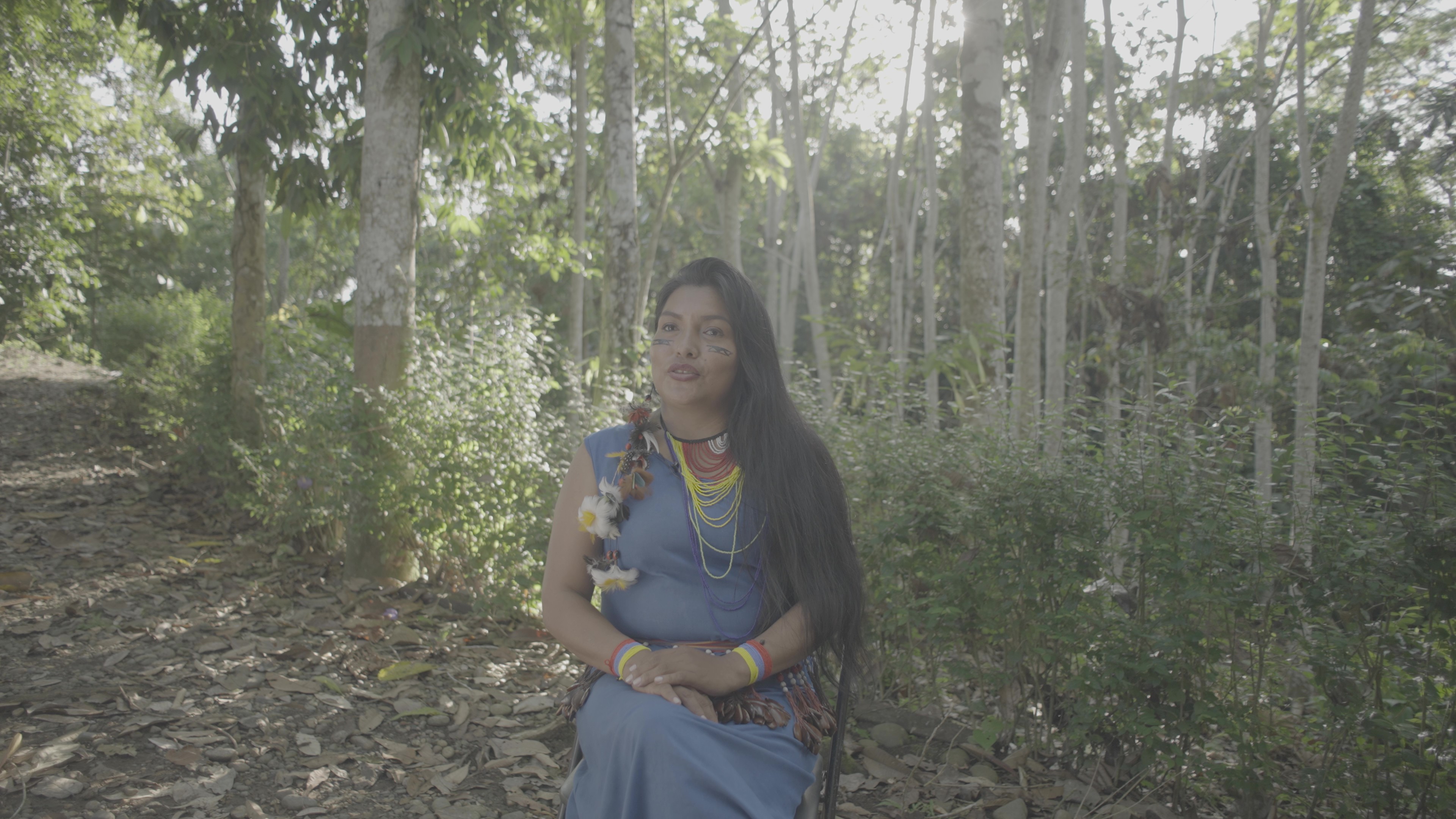
PROAmazonia Ecuador
#¿Cuál es la responsabilidad de Yamanunka con el medio ambiente?
Como pueblo Shuar, es nuestra responsabilidad cuidar el bosque, los ríos y la tierra. Estos elementos naturales son esenciales para nuestras vidas. Nos vemos a nosotros mismos como guardianes del bosque, cuidadores del suelo y el agua que nos sustentan. Proteger el medio ambiente no es solo un deber; es parte de lo que somos.
¿Ha visto un cambio en la comunidad?
Sí, ha habido un cambio importante. Hemos trabajado duro para transmitir las prácticas de conservación a nuestros hijos, nuestros hermanos e incluso a nuestras madres. En el pasado, a menudo talábamos árboles para construir nuestras casas sin pensar en el impacto a largo plazo. Ahora, somos más conscientes de cómo equilibrar nuestras necesidades con la salud del medio ambiente. Este cambio ha sido especialmente importante para la generación más joven, que es más consciente de la sostenibilidad y está deseosa de continuar nuestros esfuerzos.
¿Qué papel ha desempeñado PROAmazonía en este cambio?
PROAmazonía ha desempeñado un papel fundamental en nuestra transformación. Nos ha empoderado como mujeres enseñándonos a desarrollar bioempresas, como la artesanía y la gastronomía, al tiempo que ha aumentado nuestra conciencia medioambiental. A través de sus talleres, hemos aprendido técnicas nuevas y avanzadas para mejorar nuestro trabajo y cuidar el medio ambiente al mismo tiempo. Uno de los resultados más importantes ha sido el desarrollo de nuestro Plan de Vida. Este plan sirve como guía para nuestra comunidad, y describe nuestras prioridades y proyectos para proteger el bosque y fortalecer nuestras tradiciones. Nos da una dirección clara y nos ayuda a centrarnos en el desarrollo sostenible.
¿Cuál es el papel de la mujer ahora?
El papel de la mujer ha cambiado por completo. En el pasado, nuestra sociedad era muy patriarcal. Los hombres shuar solían ser dominantes y las mujeres tenían poca libertad para tomar decisiones o participar en el liderazgo de la comunidad. Gracias a los esfuerzos de empoderamiento de proyectos como PROAmazonía, las mujeres han encontrado su voz y su fuerza. Ya no estamos en silencio ni confinadas en el hogar.
Ahora, estamos empoderadas, somos independientes y tenemos confianza en nosotras mismas. Hemos aprendido que podemos trabajar, liderar y llevar el sustento diario a nuestras familias. Nuestros maridos nos respetan más, reconociendo que tenemos derecho a perseguir nuestras propias metas y desarrollar nuestras habilidades. Si quiero asistir a un taller o centrarme en mi artesanía, puedo hacerlo con todo su apoyo. Nacimos libres, y ahora vivimos realmente esa libertad.
¿Contribuyen económicamente las mujeres a la familia?
Sí, contribuimos de manera significativa. En el pasado, las mujeres se quedaban en casa, cuidando de los niños y esperando a que sus maridos trajeran dinero a casa. Ese ya no es el caso. A través de nuestras artesanías, generamos ingresos para nuestras familias. Cuando vendemos una pieza por 20 dólares, no es solo dinero, es un símbolo de nuestro arduo trabajo y creatividad. Esta contribución financiera nos hace sentir útiles, orgullosas y realizadas.
El trabajo también nos inspira a seguir adelante. Ver a personas ajenas a la comunidad admirar y comprar nuestras artesanías nos llena de alegría y nos motiva a continuar. Nos ayuda a darnos cuenta de que nuestras habilidades son valiosas y que tenemos el poder de mantener a nuestras familias mientras mantenemos viva nuestra cultura.
¿Cómo contribuyen las mujeres a la economía a través de la artesanía?
Hemos tenido un impacto significativo en la economía de nuestra comunidad. A través de nuestra asociación de mujeres artesanas Shuar, hemos ganado reconocimiento tanto a nivel provincial como cantonal. Hemos compartido nuestra cultura a través de nuestras danzas, artesanías, gastronomía y cosmovisión, elevando el perfil de Yamanunka.
Nuestras artesanías no son solo productos, son expresiones de nuestra cultura e identidad. Cada pieza cuenta una historia sobre nuestras tradiciones y nuestra conexión con el bosque. Nuestro trabajo nos ha ayudado a ganar visibilidad y respeto, tanto dentro como fuera de la comunidad.
¿Qué significa Yamanunka?
Yamanunka significa «tierra nueva». Fiel a su nombre, nuestra comunidad trabaja para restaurar y proteger el bosque. Estamos comprometidos con poner fin a la tala indiscriminada que en su día amenazó nuestro medio ambiente. Ahora nos centramos en la conservación, asegurándonos de que nuestro bosque siga siendo saludable y vibrante para las generaciones futuras.
